
5 things to know about Winnipeg’s big sewage problem
115 billion litres, 70 years to fix, $5.5 billion in lawsuits
“My name is Wa’xaid, given to me by my people. Wa is ‘the river;’ xaid is ‘good’ — good river. Sometimes the river is not good.”
Wa’xaid Cecil Paul, a Xenaksiala Elder, always introduced himself this way.
He was 90 years old when he passed away on Dec. 3.
Wa’xaid was born in the Kitlope River valley near Kitimat, B.C. When he was a boy, government agents forcibly took him to residential school in Port Alberni, where he was abused, leading him to decades of alcoholism.
He eventually found sobriety by returning to the Kitlope valley, washing himself in the water and listening to his ancestors. This was his home.
Upon his return, he found the old-growth forests of his territory slated for logging. He spent the first decade of his life in these forests, learning his language and culture, and he wasn’t going to watch them be taken away from his people like he had been.
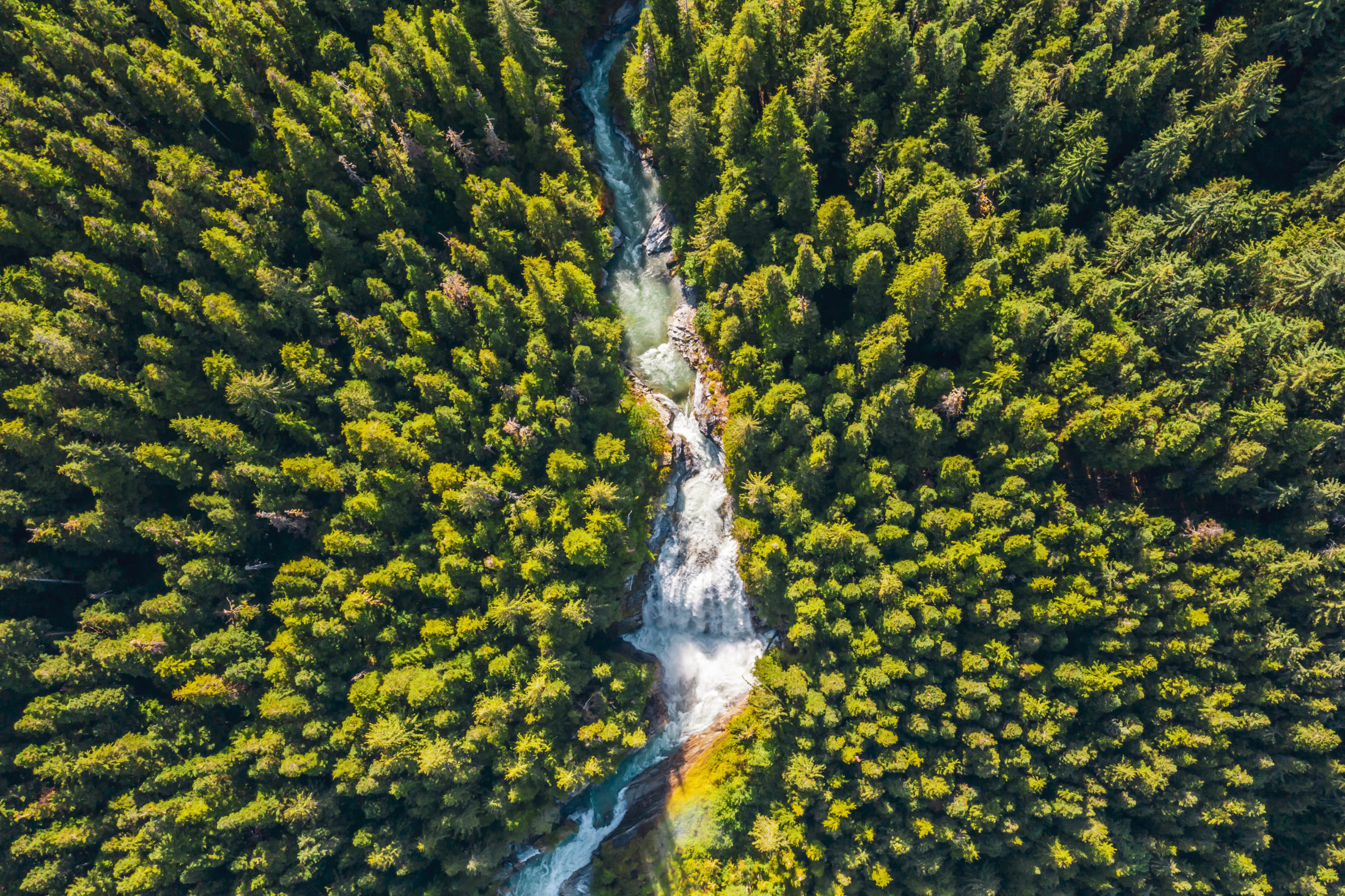
A river flows through the Kitlope valley, which Wa’xaid, whose name means “good river,” helped protect. Photo: Alex Harris / Raincoast
He began a battle to save the Kitlope valley in earnest. He took on a leadership role in preserving his people’s land and culture, gathering support from his community, conservationists and civil servants.
Those close to him say he possessed an almost mythical quality that made people listen and bridged gaps between cultures. He spoke softly but with strength and conviction. His natural storytelling ability helped people understand what he was trying to do. He famously came up with the idea of a Magic Canoe. He described it the same way every time he shared the story:
“Our destination is what I would like to talk about, and a boat — I call it my Magic Canoe. It is a magical canoe because there is room for everyone who wants to come into it to paddle together. The currents against it are very strong, but I believe we can reach that destination, and this is the reason for our survival.”
In 1994, his quiet strength and the idea of his Magic Canoe paid off when the Kitlope valley was officially protected. It is now called Huschduwaschdu Nuyem Jees, the land of milky blue waters.
The Rainforest Action Network named him a “hero of the planet” for his leadership. Early this year, he was inducted into the fellowship of the Royal Canadian Geographic Society.
Wa’xaid’s legacy lives on, not only through the preservation of sacred places like the Kitlope, but also through his words, strength and wisdom. His stories are preserved in two books co-written with author Briony Penn: Stories from the Magic Canoe and Following the Good River. The latter was published this fall and Penn told The Narwhal proceeds from the book will go to his family.
The Narwhal asked a few of Wa’xaid’s close friends and family members to share stories about him in remembrance of his life and legacy.
Gagamguist Gerald Amos was 15 years old when he met Wa’xaid. Amos spoke fondly of his friend, but said he recently suffered a heart attack and was unsure of the accuracy of his memories. Despite that, he said Wa’xaid’s life still inspires him.
I had a heart attack, hey? I think the doctors made a mistake and it affected me. When I get a little — how do I say it? — depressed might be the only word, the memory of what he went through inspires me to think a little bit more positively about the future.
And I hope that I’m not the only one that thinks that way.

Wa’xaid would always say, “If you respect the river, that river will respect you.” His sister, Amalaxa Louisa Smith, said he was always adamant that anyone boating up the Kitlope make sure everything was in good running order before setting out. Photo: Briony Penn
Amalaxa Louisa Smith is Wa’xaid’s sister and describes him as her best friend. She was by his side during his hardships and successes and was with him at the end. In 1991, with Amos and others, she travelled to Stockholm, Sweden, to request the Museum of Ethnography return the G’psgolox pole that was taken from the Xenaksiala people by the Swedish vice-consul in 1929. It took 15 years of negotiations before the pole was finally returned. When it was, the Xenaksiala carved a replica pole and sent it to Sweden as a gift.
Before we [went to Sweden], Cecil gave us specific instructions. “You put your best foot forward, put your regalia on and show them who you are. Don’t say that [the totem pole] was stolen, say that it was taken without our consent.”
He was very adamant that we needed to be very respectful to the people we negotiate with. “Show your respect. Just be who you are. Don’t let anger get in the way.”
Basically, that’s what we did.

The G’psgolox totem pole was taken from the Xenaskalia people in 1929 and displayed in a museum in Stockholm, Sweden. After 15 years of negotiations, the pole was finally returned in 2006. In 2012, it was taken back to a gravesite close to where it was originally erected. Photo: Briony Penn

Wa’xaid speaks in front of the G’psgolox pole. His strategy to convince the museum to return the pole was to show respect and not let anger get in the way. Photo: Kevin Smith
My brother, when he is really concentrating, intently concentrating, he will close his eyes to block out any distraction. And he listens to understand what the person is saying and he doesn’t answer right away. He’s contemplating what he heard before he answers.
Whenever it was trouble to find an answer himself, he’d go out to the Kitlope to meditate. See if he could get answers from the ancestors.
He’s always saying, “Listen, listen. Watch the leaves when the wind blows through the leaves. See how they dance. Listen and you can hear their music.”
Roy Henry Vickers is an acclaimed artist and carver who lives on the Skeena River near Kispiox. In 1993, he went on a guided boat trip up to the Kitlope valley and Wa’xaid was a guide. Vickers said it was the beginning of a lifelong friendship.
We went up into Kitlope Lake and looked up at the mountain. He talked about the man who turned to stone who’s sitting up on the top of the mountain and his steps that go up the mountain.
And for me, listening to him, it was like my grandfather was still alive. He was telling me stories of the Kitlope. It was one of his favourite places and I’d never been there. He shared about the eagles and ravens and whales and wolves, different fishing places, the creeks that come into Kitlope Lake.
We’re sitting together somewhere and he said, “You know, you’re going to do a lot of things down the road and it’s like a warm wind blowing and people are going to feel it when it comes.”
I often wondered what that was that he was referring to.
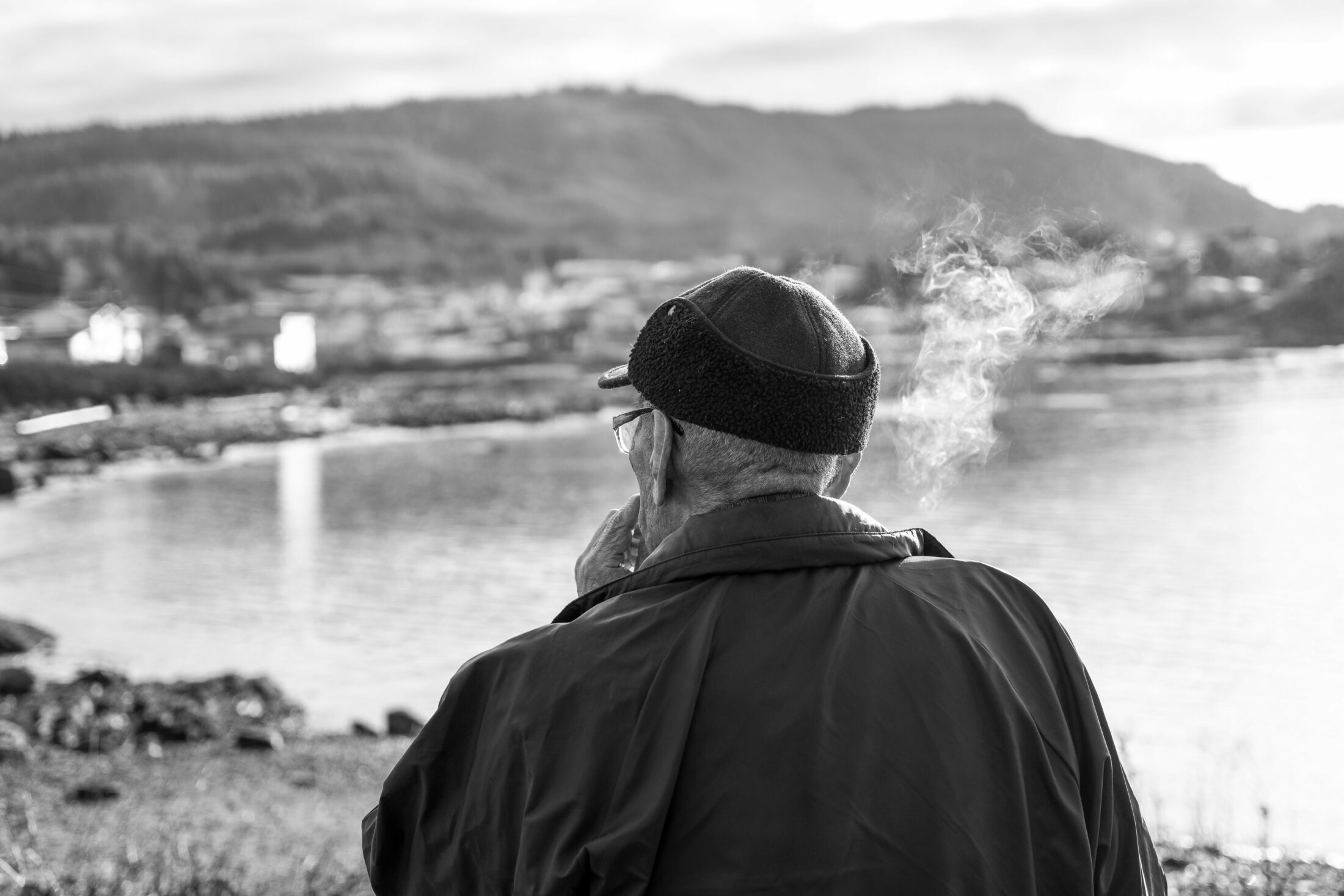
Wa’xaid stands on a beach at Lax’Kwalaams. His influence reached far beyond his own territory. Photo: Callum Gunn
I was adopted into the House of Walkus years later and carry the chieftainship Tlakwagila in Owikeeno. Tlakwagila means copperman. It’s a hereditary chieftainship that’s thousands of years old.
The last time I talked to Cecil, he said, “You know that warm wind I was talking about? Well, part of it is already blowing across the land. You carved that totem pole for the House of Walkus. And that’s the first time that village has had a new pole raised in the village. And that’s the warmth that’s coming back to our people through your storytelling and your skills.”
What they say is, the old ones are with us. You are your grandfather, you are your grandmother. And if you listen, they will speak to you. [Cecil’s] eyes would be closed [when he spoke]. Because he would be looking at these images, and I do the same thing. And I always want to remember him saying, “Yes, there’s a warm wind coming. It’s coming from the south.”
And I realized I’m part of that warm wind. I’m returning from the south to the north. I lived in Victoria and Tofino for years. And now I’ve come back to the north. So it’s that — there’s a connection that we have that defies intellect.

Haisla youth paddle a canoe to Misk’usa, the village site where the G’psgolox pole originally stood. Photo: Sam Beebe
‘Cúagilákv Jess Housty is a Heiltsuk mother, writer and land-based educator who lives in Bella Bella. In 2016, shortly before Prince William and Kate Middleton were scheduled to visit Bella Bella, Wa’xaid asked Housty to request an apology to Indigenous people from the Royal delegation. She wrote a letter and handed it to the prince. Wa’xaid later sent Housty a copy of his first book in which he told the story and included a copy of the letter.
A couple of weeks before the event was happening in Bella Bella, I was in Vancouver for work, walking down the sidewalk one evening when my phone rang. I wasn’t sure there was anyone on the other end of the line. His voice was so soft, I had to step in an alley out of the traffic noise to hear.
It was Cecil. I don’t know where he got my phone number. He was very earnest when he told me that he felt really strongly the Queen needed to formally apologize to Indigenous people for the violence and harm of colonization. He wanted me to bring that message to the delegation that was coming for the Royal visit. He felt really strongly that we couldn’t move past the wrongdoings without that acknowledgement.
I remember being a little bit awestruck that of all the people he could have phoned, he phoned me.
He spoke with a sense of urgency and confidence that I would be able to make it happen.
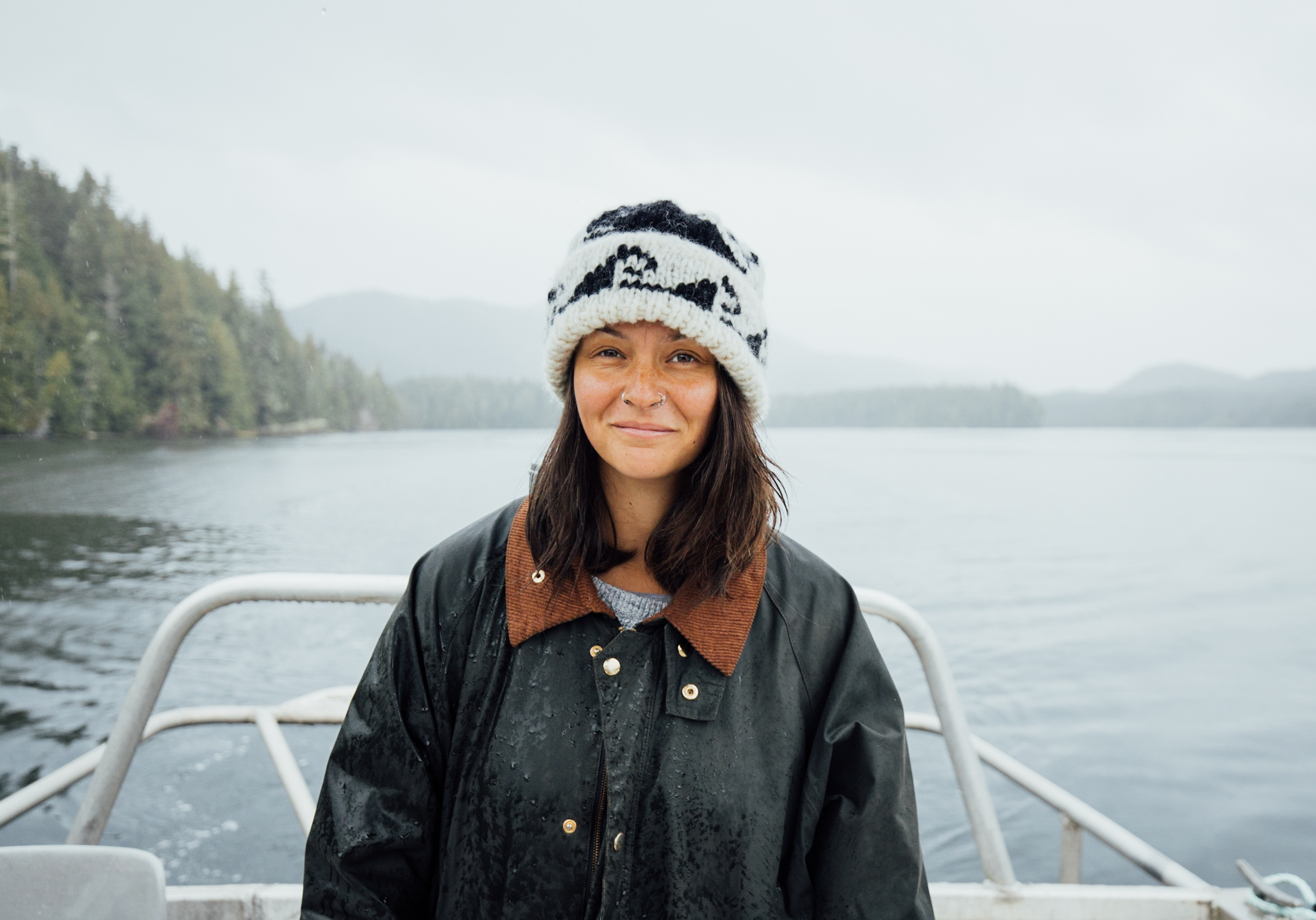
Jess Housty was inspired by the trust Wa’xaid placed in her ability to ask the Royal Family to apologize for the harms colonization inflicted on Indigenous people. Photo: Louise Whitehouse / The Narwhal
When I think about what makes me feel empowered in the work that I do, a lot of it comes down to those moments and people like Cecil who I love and respect and admire so much, to feel the trust they had in me.
He was gentle but definitely unshakable as well. It was so easy to feel just as much conviction as he did when he spoke.
And a few years ago, I got a message from him that he didn’t need his personal book collection anymore. He wanted to send them to our library in Bella Bella. I offered to pay the postage, to mail the boxes down. And he refused. He collected cans and returnables until he had enough cash to cover the postage to mail them to us. He wanted to do it on his terms. We now have so many beautiful books in our collection that are really beloved by community members.
That was the way he did things. He had such a clear vision for what he wanted to do and he had so much conviction about how he was going to do it.
Briony Penn is a conservationist and author based in Victoria. Her latest book traces Wa’xaid’s life, based on recorded interviews and journal entries she kept while spending time with him and his family. She said Wa’xaid would take her places and point out landmarks that would trigger stories. One day, he took her to visit Vickers.
Sometimes it’s the synchronicity of Cecil’s life — the way that he is woven in and out of the coast, and all the way up into the interior.
I was visiting with him in Prince Rupert, staying with his sister, Louisa, and he said, “Let’s go see Roy Henry Vickers.”
I said, “Oh, where is he?”
And he goes, “Well, I think he lives somewhere near where my sister was in Kitwanga, somewhere out there.”
We set off from Prince Rupert. I asked if he had a phone number and he said, “No, no, let’s just go.”
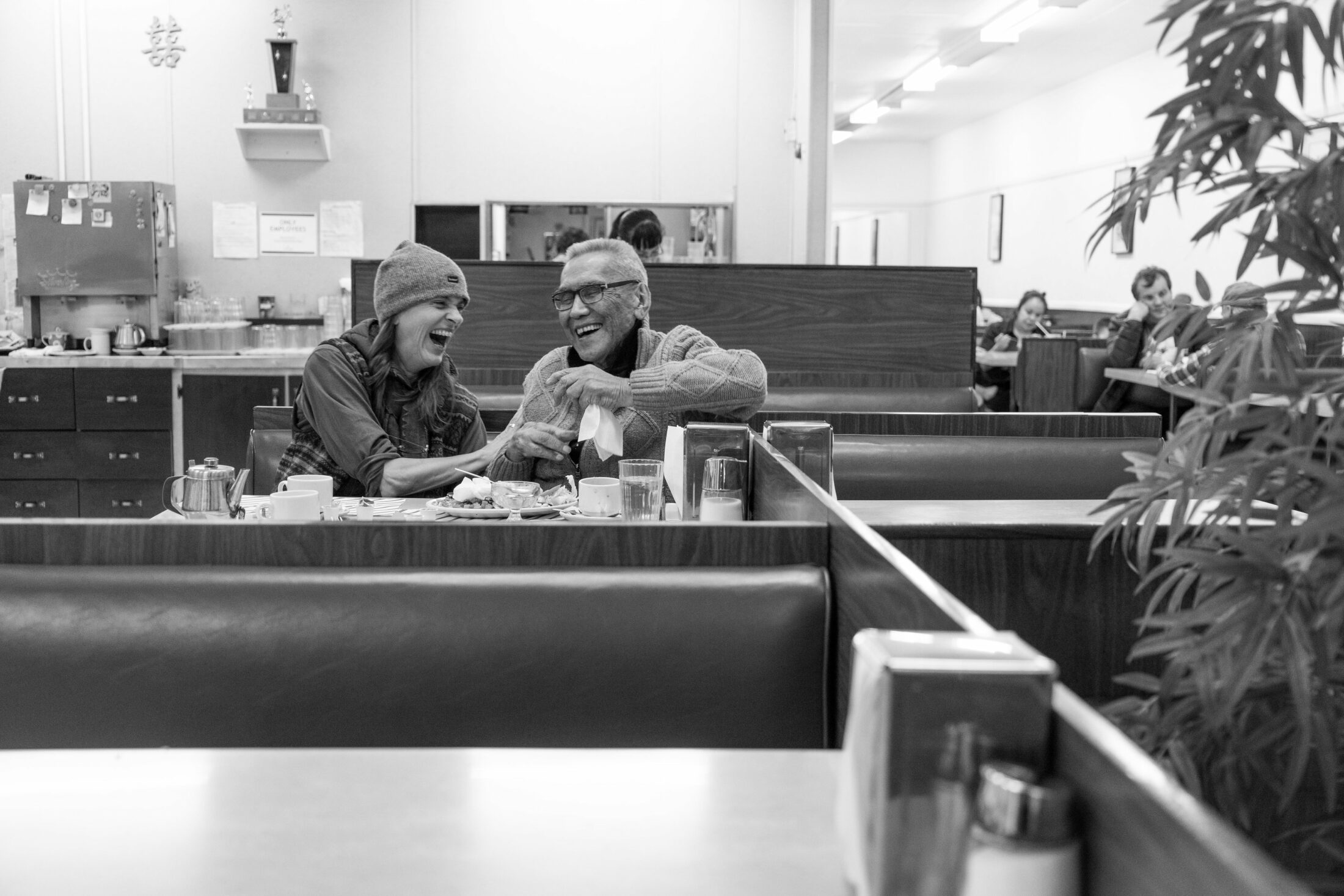
Author Briony Penn shares a laugh with Wa’xaid at one of his favourite restaurants, the West End Cafe, in Prince Rupert, B.C. Photo: Callum Gunn
We travelled all day, up the Skeena and had this beautiful day. We got to the cross section of Kitwanga and the highway right at five o’clock. We were going to go to the little tourist information centre there, but it closed the second we arrived. There was this guy standing at the corner of the road and I actually recognized him. He was a herring fisherman, a herring advocate that I know from the coast.
So I said, “David, what are you doing here?”
And he’s like, “Briony, what are you doing here?”
“I’m with Cecil Paul and we’re looking for Roy Henry Vickers.”
And he goes, “Michael here works for him. He’ll show you where Roy Vickers is.”
We followed him and we got to Roy’s beautiful log cabin on the river and walked up to the door. We knocked on the door and Roy opened it. And he just immediately started to cry and said, “Cecil, how did you know?”
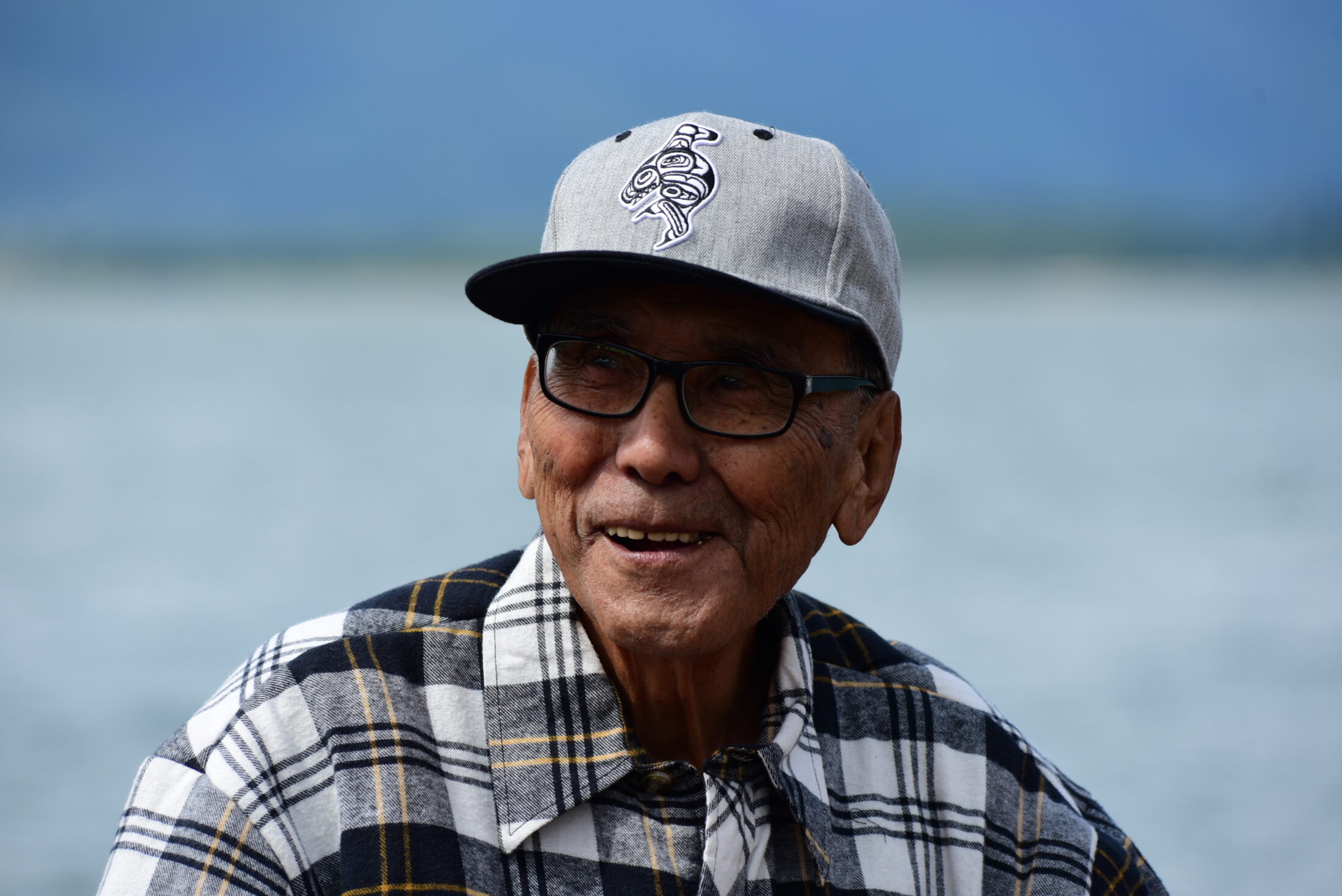
After decades of alcoholism, Wa’xaid found sobriety and healing by returning to the valley of his birth. He said anyone who visited the Kitlope would leave a changed person. Photo: Greg Shea
Roy, that day, had finished carving the House of Walkus pole for an Elder in Owikeeno. He was carving that pole because he got the idea from Cecil of creating a replica pole to replace the original one that had been stolen. And Walkus and Wa’xaid are the same word — good river. And Owikeeno is the community from which the Xenaksiala story emanates.
The language is similar. And he had just finished the pole that day. There were four young carvers that he’d done it with. And they needed to bless the pole and none of them spoke any of the dialects of the language.
Cecil just walked right in and did a pole blessing ceremony — because that’s what he does.
Get the inside scoop on The Narwhal’s environment and climate reporting by signing up for our free newsletter. On a warm September evening nearly 15...
Continue reading
115 billion litres, 70 years to fix, $5.5 billion in lawsuits

Climate change, geopolitics and business opportunities power a blue economy

10 billion litres of sewage are dumped into Winnipeg’s lakes and rivers each year. Some...
